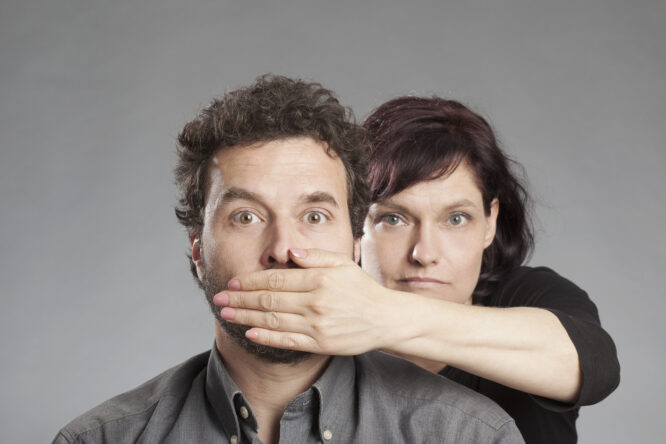Not everyone is a natural when it comes to socialising, and that’s fine.

However, there are certain behaviours that can make hanging out with you awkward, frustrating, or uncomfortable without you even realising it. Social skills don’t require being charming or extroverted; they’re about understanding how to make everyone feel seen, heard, and respected. If people tend to pull away, change the subject abruptly, or seem drained after spending time with you, it might be time to check if a few of these signs sound familiar.
1. You constantly interrupt people mid-sentence.

Everyone slips up occasionally, but if interrupting is your default, it makes people feel like their words don’t matter. It creates a dynamic where people feel rushed or dismissed, like they’re just holding a place until you can speak again. Conversations should feel like a flow, not a fight for airtime. Learning to pause and actually let someone finish is one of the simplest ways to improve how people experience you.
2. You overshare way too soon.

Sharing personal stories can be great, but dropping deep or intense information within minutes of meeting someone tends to overwhelm rather than connect. Social timing matters, and dumping your life story on someone too early can make them feel trapped instead of trusted. Healthy social connection builds gradually. If you notice people pulling away or looking uneasy, it might be worth checking if your level of openness matches the moment.
3. You dominate every conversation.

Being talkative isn’t automatically a bad thing, but if you’re doing 90% of the talking, it’s not a conversation—it’s a monologue. People want to feel involved, not like they’re just a sounding board for your thoughts. Good conversationalists ask questions, pause for responses, and let the discussion breathe. If you’re steamrolling over every topic, you might be draining the room without realising it.
4. You don’t notice when people are uncomfortable.

Basic social awareness includes reading the room, and that means picking up on body language, tone, and awkward silences. If you keep pushing a topic or joke that clearly isn’t landing, it shows a lack of sensitivity to other people’s cues. That doesn’t mean you need to be perfect at reading people. However, ignoring obvious discomfort (or worse, doubling down on it) is one of the fastest ways to make people avoid future conversations with you.
5. You constantly correct or “one-up” people.

Whether it’s fixing someone’s pronunciation, adding unnecessary trivia, or offering a “better” version of their story, this habit makes people feel small. It turns a casual chat into a competition, and no one likes feeling like they’re being graded mid-conversation. You don’t have to pretend you don’t know things. But unless someone’s asking for corrections or insight, let the moment pass. Social grace often means biting your tongue, even when you’re technically right.
6. You talk at people instead of with them.

If you tend to launch into long speeches without checking in or pausing for input, it can come across as self-absorbed. People might smile and nod, but inside they’re counting the seconds until it’s polite to leave. Great social flow feels mutual. It’s not about impressing people with how much you know—it’s about creating space for everyone to feel included.
7. You make everything about yourself.

If someone shares a story and your first instinct is to share your own version of it, you might think you’re being relatable. However, if it always circles back to you, people will start to feel like background noise in your show. Connecting is less about echoing someone’s experience and more about being present with theirs. Sometimes, the best thing you can do is just let their moment be theirs without adding your own.
8. You don’t ask people any questions.

Conversations can’t thrive if only one side is being curious. If you rarely ask follow-up questions, people feel like you’re not really interested—or worse, like you’re waiting for your turn to talk. Even basic questions like “How did that feel?” or “What happened next?” can go a long way. Asking shows presence. Silence or vague nods just make people feel unseen.
9. You struggle with basic greetings or small talk.

Eye contact, saying hello, or asking how someone’s doing might seem minor, but they’re the glue of social interaction. If you regularly skip these steps, people might feel brushed off or awkward in your presence. You don’t need to become a small talk expert, but a little warmth and acknowledgment at the start of a conversation helps ease tension and create connection.
10. You don’t notice when people are trying to leave.

If people keep checking the time, packing their things, or dropping hints that they need to go—and you keep chatting—it shows a lack of social readjustment. No one likes feeling cornered. Respecting someone’s time is part of being socially attuned. When people sense that you don’t pick up on these cues, they’ll either avoid conversations altogether or cut things short next time.
11. You constantly make it awkward without meaning to.

This might look like laughing at the wrong time, asking personal questions too soon, or blurting out opinions without context. Everyone gets it wrong sometimes—but if it happens a lot, people may start to brace themselves when you speak. You don’t need to censor your personality, but it’s worth slowing down and noticing how your words land. Even a small moment of awareness can smooth things out in a big way.
12. You don’t show any appreciation during conversations.

People enjoy being around people who make them feel valued. If you never say things like “That’s interesting” or “Thanks for sharing that,” you may come across as dismissive, even if you’re listening. It’s a subtle thing, but those little signals—smiling, nodding, affirming what someone’s said—show people they matter. A lack of that feedback makes even a good conversation feel cold.
13. You never apologise when you mess up socially.

We all misread cues or say the wrong thing now and then. However, if you never circle back to say, “Sorry if that came out weird” or “Didn’t mean to interrupt,” it can leave tension hanging in the air. A quick apology shows maturity and self-awareness. It helps clear the air and lets people know you care about how you come across, even if you’re still learning.
14. People seem drained after talking to you.

One of the clearest signs that your social skills need work is if people consistently seem tired or flat once the conversation ends. Maybe they started upbeat and left quiet. That change is often a sign you talked too much, didn’t listen, or missed their cues entirely.
When people feel energised, seen, or relaxed after a chat, that’s a good sign. If they keep backing away after interactions, it’s worth checking in on your habits—not to beat yourself up, but to grow into someone people enjoy being around.




